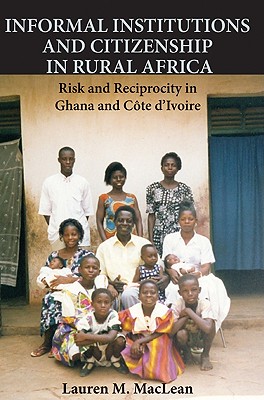This book challenges previous assumptions about institutions, social capital, and the nature of the African state by investigating the history of political and economic change in villages on either side of the Ghana Cote d Ivoire border. Prior to European colonial rule, these Akan villages had very similar political and cultural institutions. By the late 1990s, however, Lauren M. MacLean found puzzling differences in the informal institutions of reciprocity and indigenous notions of citizenship. Drawing on extensive village-based fieldwork and archival research, MacLean argues that divergent histories of state formation not only shape how villagers help each other but also influence how local groups and communities define citizenship and then choose to engage with the state on an everyday basis. She examines the historical construction of the state role in mediating risk at the local level across three policy areas: political administration, social service delivery, and agriculture, highlighting the importance of the colonial and post-colonial state in transforming informal institutions."
| FindBook |
有 1 項符合
Informal Institutions and Citizenship in Rural Africa: Risk and Reciprocity in Ghana and Cote d’Ivoire的圖書 |
 |
Informal Institutions and Citizenship in Rural Africa: Risk and Reciprocity in Ghana and Cote d’Ivoire 作者:MacLean 出版社:Cambridge University Press 出版日期:2010-05-24 語言:英文 規格:精裝 / 292頁 / 23.6 x 15.7 x 2.5 cm / 普通級 |
| 圖書館借閱 |
| 國家圖書館 | 全國圖書書目資訊網 | 國立公共資訊圖書館 | 電子書服務平台 | MetaCat 跨館整合查詢 |
| 臺北市立圖書館 | 新北市立圖書館 | 基隆市公共圖書館 | 桃園市立圖書館 | 新竹縣公共圖書館 |
| 苗栗縣立圖書館 | 臺中市立圖書館 | 彰化縣公共圖書館 | 南投縣文化局 | 雲林縣公共圖書館 |
| 嘉義縣圖書館 | 臺南市立圖書館 | 高雄市立圖書館 | 屏東縣公共圖書館 | 宜蘭縣公共圖書館 |
| 花蓮縣文化局 | 臺東縣文化處 |
|
|
圖書介紹 - 資料來源:博客來 評分:
圖書名稱:Informal Institutions and Citizenship in Rural Africa: Risk and Reciprocity in Ghana and Cote d’Ivoire
|











